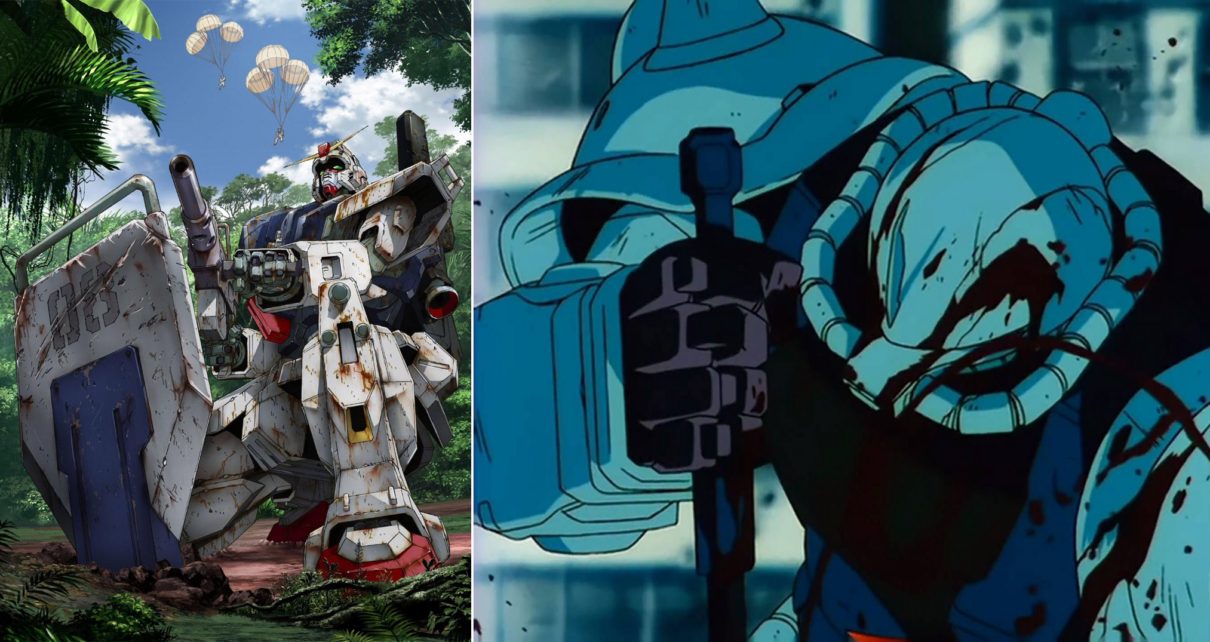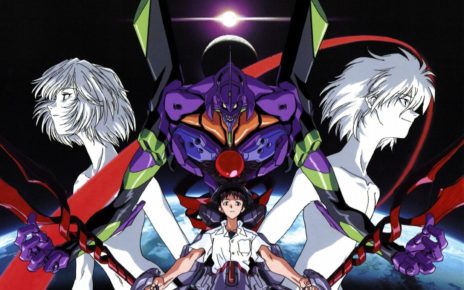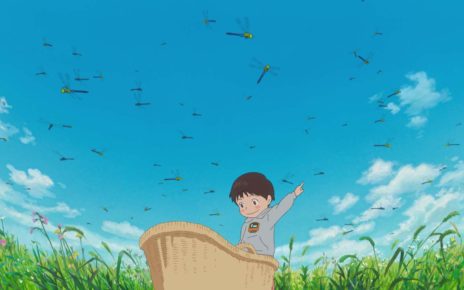If it seemed like the world was constantly at war in the ’90s, that’s because it was. Armed conflicts raged across six continents through that decade, from domestic rioting in North America to political coups in Central and South America to ethnic cleansing in Europe, Africa, Asia, and beyond. Mass media and the 24-hour news cycle brought the concept of the Forever War in all its banality home, and that fray birthed Mobile Suit Gundam: The 08th MS Team, which debuted in Japan in 1996 and ran on Cartoon Network’s Toonami block just a few short years later, before 9/11, in 2001.

War Is for Losers is a meditation on Mobile Suit Gundam.
The 08th MS Team, a show about average grunt soldiers enduring the tolls of war from a variety of perspectives, is as remarkable for the narrative and production wizardry it deployed as it was for the face-lift it gave to the core conflict of the Gundam franchise, the One Year War. And in its a tightly wound 12 episodes (plus a short movie and a much shorter webisode), it never outstays its welcome. Let’s talk about how it pulled that off and why it’s the perfect entry point if you are trying to find a way into the Gundam franchise.
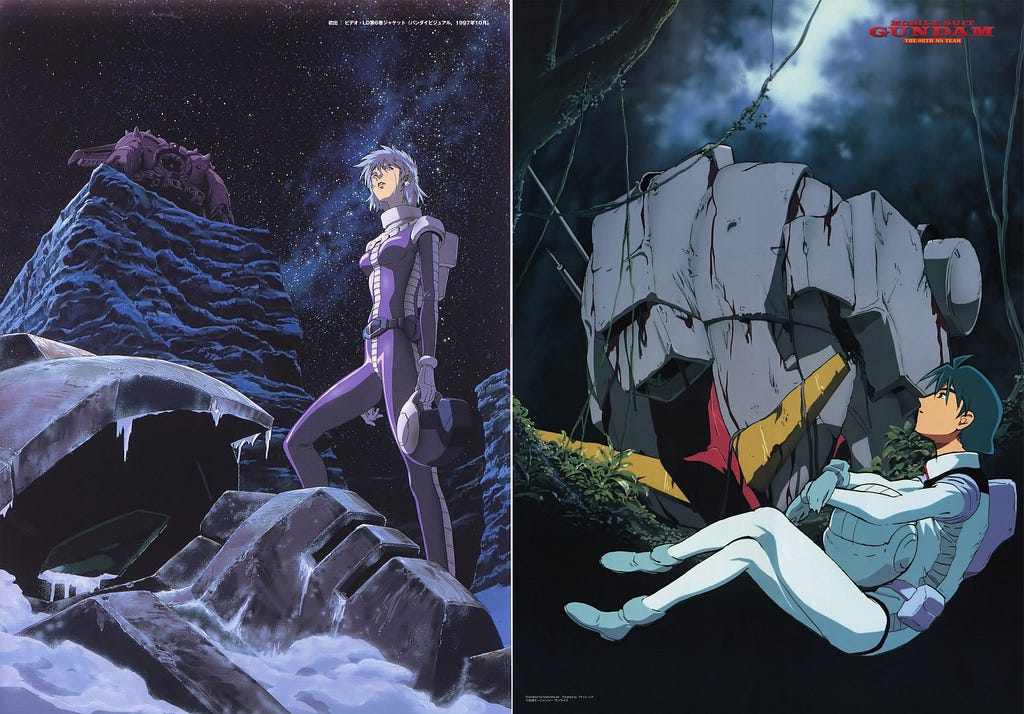
It’s about star-crossed lovers
Not many of the Gundam shows are straight up, capital-R Romances, but 08th MS Team is one in the tradition of war films like From Here to Eternity, A Farewell to Arms, and Atonement. We meet the star-crossed (literally, in space) lead couple on opposite sides of the war in the first episode: Shiro Amada, a lieutenant of the Federation, and Aina Sahalin, a test pilot for the Principality of Zeon. When circumstance thrusts them into a situation where they have no choice but to cooperate, they develop feelings for each other. Shiro is charismatic, humble, and a resourceful survivor, and Aina is intelligent, empathetic, and a talented pilot. The totem that Aina shares with Shiro in the first episode, a pocketwatch, symbolizes how precious their time alive is, even as they and their allies waste it by fighting each other.
The show sets you up to care for both of them from the jump, which was weird for this franchise when the series landed in 1996. Well-developed antagonists like Char Aznable (Mobile Suit Gundam) and Four Murasame (Zeta Gundam) had always made romance with the enemy a narrative option for the long-running franchise, but 08th MS Team set Shiro and Aina up in space, alone, desperate, and desperately idealistic—together—from the start. It’s emotional, but it’s also hot, and it powerfully complicates the series view on both the Federation and the Zeon. After Aina and Shiro save each other’s lives, her personal crisis within the Sahalin family and Zeon becomes clear, and his Federation’s willingness to resort to brutal tactics doesn’t look so noble either.
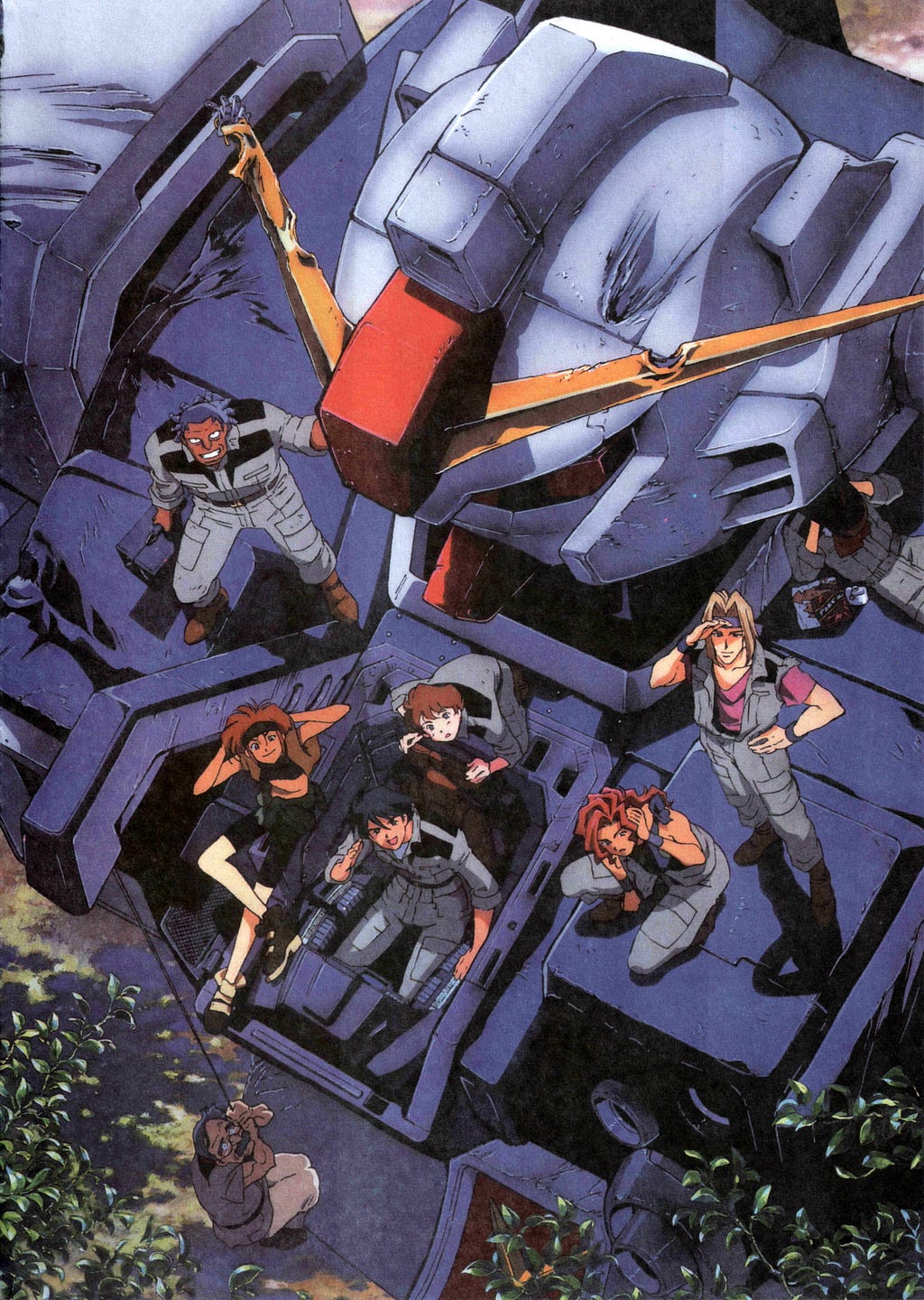
It’s about grunts on the front line
Contrary to the format of almost every other Gundam show, 08th MS Team’s heroes aren’t kids, sociopaths, or wizards, but regular soldiers. Rather than glorify any element of the bloodshed its giant robots inflict, the show pulls its dramatic payoffs from humanizing these people and sticking them in mundane and terrifying situations. One soldier is wracked with survivor’s guilt after seeing past units get wiped out, another wants to leave the front so he can become a songwriter, and another endangers the team because he can’t stop thinking about the letters he sends to his girlfriend back home. Shiro gets flashbacks to the time he witnessed the effects of war crimes committed against civilians. In possibly the only scene of its kind in the franchise, one of the characters is court-martialed for a questionable decision in battle.
It’s not just the lead Federation soldiers either. Even guest-starring Zeon pilots with just a few lines are designed with frayed, lived-in uniforms, and their mobile suits are adorned with pictures of their children. 08th MS Team bends over backwards to keep the morality of its conflict as gray as possible. Every soldier has some backstory or some reason to live that the show calls out in obvious or subtle ways. It’s all the more tragic if and when they ultimately die, but the discipline toward this makes 08th MS Team possibly the most anti-war series of the anti-war Gundam franchise.
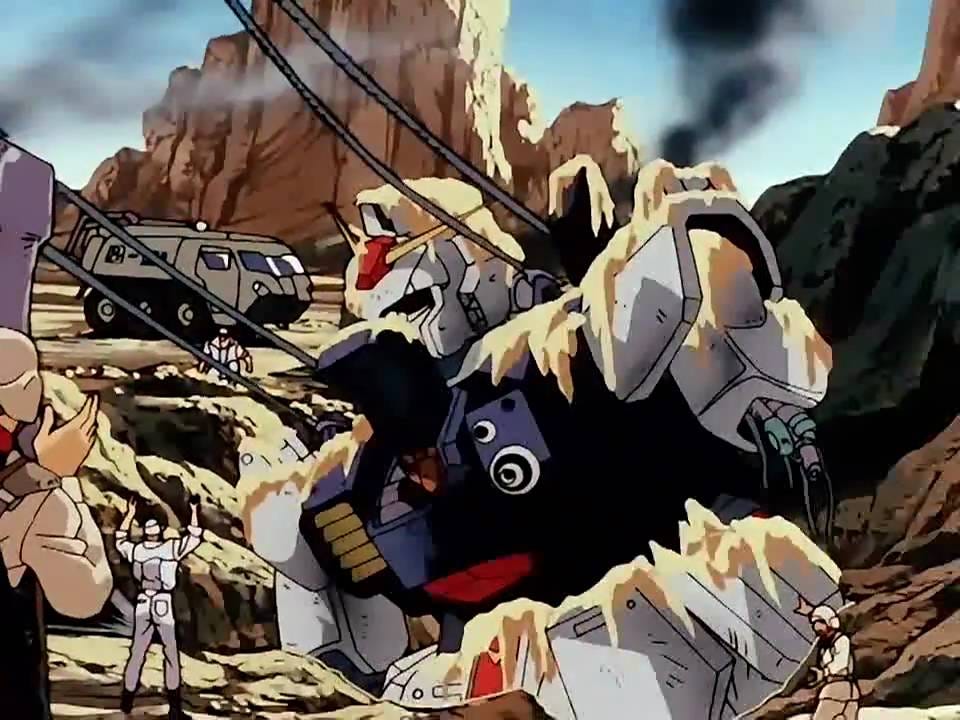
It’s about constant equipment failure
Because 08th MS Team’s perspective begins and ends with ordinary soldiers, almost every giant robot and heavy tank used is a production model. The only “custom” mobile suits are the Zeon’s prototype at the heart of the show’s central conspiracy and a lone blue Gouf, the mobile suit of ace Zeon pilot (and exhilarating antagonist) Norris Packard. It’s also telling that the show’s least sympathetic character is Ginias Sahalin, Aina’s brother and the true Big Bad of the show. He’s neither an inspiring commanding officer nor a talented ace pilot nor a grunt soldier, but a weapon’s designer obsessed with optimizing mass destruction, even at the expense of his fellow Zeon allies.
Apart from Ginias’s creations, every machine is a production model and often a troublemaker for its pilots at that. The Gundams crap out constantly, to the point where much of the show’s marketing displays them shot to hell, in tatters, and out of commission. They get stuck in the sand. They break during training exercises. They get ripped to shreds when the soldiers encounter more experienced opponents. They also require a good amount of amateur hacking. Shiro may not have the Newtype skills of Amuro Ray or Char Aznable, but we do watch him reboot a mobile suit’s electrical system from the inside on one occasion and use one of its giant beam weapons to make a hot spring on another. At one point he runs out of weapons and rips his own Gundam’s arm off to use as a makeshift club against an ace pilot. It works.
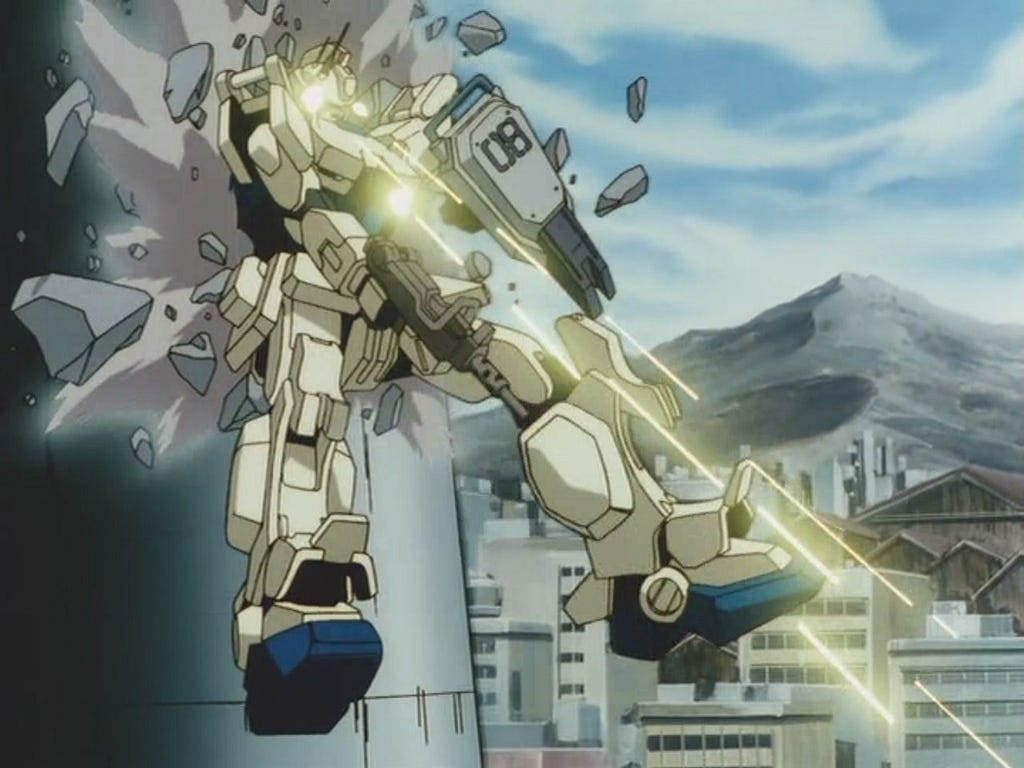
It’s got the most dynamic action scenes
Believe it or not, the scene where Shiro rips his own Gundam’s arm out happens in one of the series’ climactic sequences. Animation-wise, there’s an attention to weight in 08th MS Team that sets it apart from the rest of the Gundam pack, partly because most of its battles are set on Earth and partly because its animators were just so talented. The ground erupts when the Gundams fall through abandoned cityscapes, and you can see the pebbles of concrete fly everywhere as it does. Several episodes play with tension, making use of gravity, the environment, and the limits of what the heroes do or don’t know on the battlefield and what their senses can or can’t tell them. When they finally encounter a true ace pilot in the final two-part episode “The Shuddering Mountain,” the battle that ensues is a dazzling display of close- and long-range combat.
Perhaps most importantly, given the fact that these are giant robots fighting among puny humans, 08th MS Team is always attentive to scale. In “The Shuddering Mountain,” a battle between just a few of the giant mobile suits completely levels large city districts. Several episodes reference the fact that mobile suits are equipped with anti-personnel mines meant to horrifically maim or kill soldiers on foot. In another episode, soldiers walking through fields in one of them run the risk of wiping out the crop yield of a whole village. The mysterious, massive robotic mobile armor created by Ginias Sahalin, the Apsalus, uses a giant laser weapon that turns sand to glass. At various points throughout the series, characters outside of their mobile suits remark on all this destructive power with awe, acutely aware of how small they are by comparison.
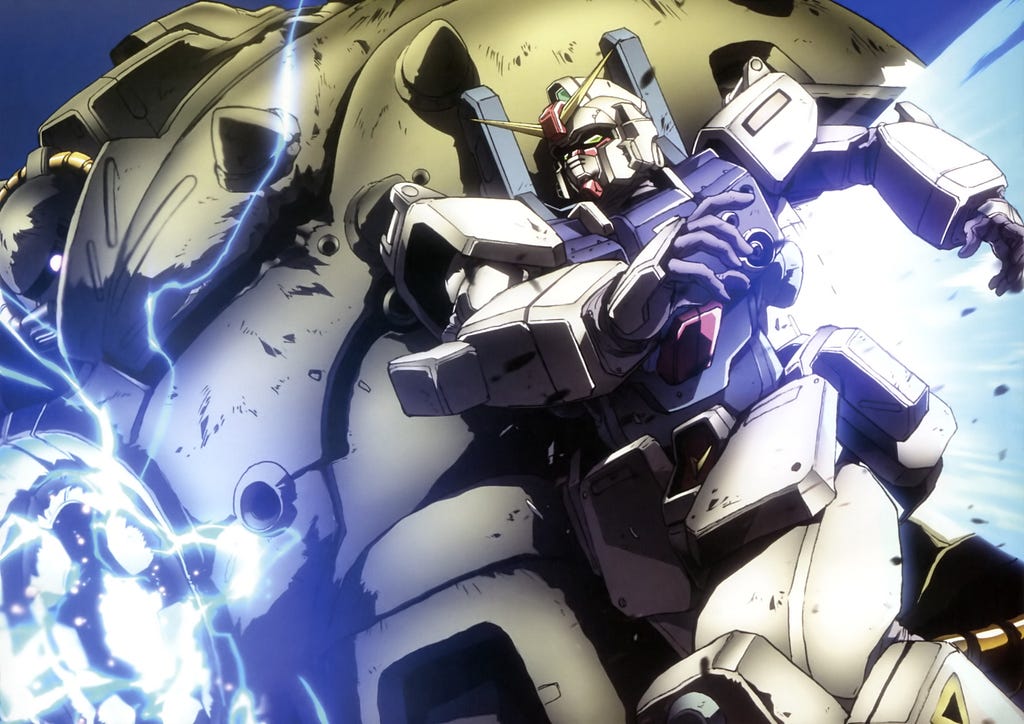
It’s not *really* about “Gundams”
08th MS Team’s finale has a great, nuanced payoff, one that arrives after less than half the length of a season of practically any American primetime series. The show wastes zero time in getting you invested in its characters and setting them off against each other. Before the show ends, military commanders in both the Federation and Zeon question their own roles in the sabre rattling and bloodshed that come with arms races, brinkmanship, and tactics that result on civilian casualties. Gundam creator Yoshiyuki Tomino has infamously created “kill ’em all” shows in his career, but 08th MS Team was the first Gundam series that wasn’t about Gundams at all, but about the atrocities they and other weapons of war can facilitate.
That it manages to pack as much story and empathy into so short a space is extraordinary, but it makes some sense. This show’s ambitions seemed small, but it executed on every one of them. 08th MS Team’s doesn’t philosophize about the future of mankind like Mobile Suit Gundam did, or comment on how fascism could overtake democracies gripped by fear the way Zeta Gundam did, or babble about the “beauty” of fighting like Gundam Wing did. No. 08th MS Team landed as the world engaged in perpetual war and focused on how people lived, fought, and sometimes died on the ground.
Giant robots were involved, but they were never the point.
Thanks for reading The Dot and Line, where we talk about animation of all kinds. Don’t forget to follow us on Twitter and sign up for our newsletter.


